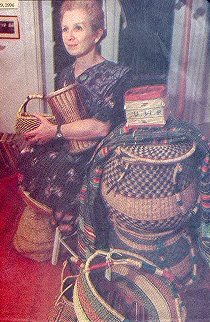| The Boston Sunday Globe, September
29, 1996. By Sally Abrahams A Brookline potter finds Ghana a source of inspiration. BROOKLINE
- When you walk into Ellie Schimelman's living room,
don't expect to find a sweet matching sofa and love-seat
or a nature painting over the fireplace. And you
shouldn't expect anything so commonplace anywhere else in
her house, either. Not at Schimelman's. There, you'll be
greeted by an enormous, fully open, African chiefs
umbrella made with bright blue, orange, yellow, red, and
green kente cloth. Two straw "initiation hats"
- which Schimelman said are worn by girls from a tribe in
Ghana after they have participated in a coming-of-age
ceremony - hang from free-standing tree branches held in
place by a floor vase. An African shirt is draped on the
door into the dining room. And large, handsome, handmade
baskets surround the fireplace and can be found all over
her Brookline Village house. The umbrella was the gift of
a Ghanaian friend. Schimelman, 57, also knows the other
craftspeople whose work adorns her home. That's because
Schimelman, herself a potter, spends four months each
year in the tiny West African country Of Ghana, taking
American artists there to study with master weavers,
beaders and potters. After each trip, she returns laden
with baskets, brass-carved figures, beads and woven
cloth-, which she sells out of her house. All the profits
go back to the Ghanaian artists, she said. Schimelman
created her ABA Tours 18 months ago and has taken 25
artists to Ghana since. (ABA means female bon on
Thursday, the day of Schimelman's birth. Many people in
Ghana are named for the day of the week on which they
were born. Schimelman's cat is Ama, which is a female bon
on Saturday.) She is currently in Ghana planning the
winter and summer tours, which cost $2,500 and include
air fare, lodging for two weeks and art lessons.
"What they won't get is a bus tour. My trips aren't
for people who like to stay in an air-conditioned bus and
see things from afar," said Schimelman, who
discovered Ghana 18 years ago. "My aim is to
integrate the Americans with the Ghanaians as much as
possible, so our artists can see how they live and work
and get to know them. I try to do it all on A very
personal level." Schimelman's friends, in fact, will
invite her group to have dinner at their houses.
Schimelman, who is a part owner of the Cambridge Artists
Cooperative and has taught crafts at a number of adult
education centers in the Boston area, stays with her
charges in Ghanaian cultural centers or houses in the
village designed for visitors. They travel to the
northwest Ashanti region known for its traditional
crafts, southeast to the Volta area, famous for weaving,
and to Odumasi Krobo, a village renowned for beading. A
graduate of the Rhode Island School of Design and a
former crafts teacher in the Wellesley public school
system, Schimelman always loved African art. Ghana is
known for its weaving and cotton cloth, and she wanted to
go to a country that was politically stable. Nearly two
decades later, she is sharing the country with others.
Last winter, Marcella Stasa of Upton discovered Ghana
with Schimelman. "This was a way to get an insider's
view. You don't always get a chance to live in an African
village," said the weaver and ceramist, who stayed
in a Ghanaian weaving village without electricity.
"It was neat to be integrated into the weaving
culture, or as much as a bunch of white women from the
States could be! Everything we saw, every market we went
to, was food for the eye and I came back with loads of
ideas. I'm still working on some of the projects I
started there," Stasa said. Schimelman said going to
Ghana also helps her as an artist. "[The people]
really energize me. It's a different and rich culture
that looks at things differently and I find that
inspiring," she said. When in Brookline, Schimelman
works in her basement studio crafting bright cups, bowls
and plates, depicting primitive animal figures that
reflect an African influence. Schimelman is in Africa for
the month, meeting with a local architect she hired to
draw up plans for an artists' retreat that she hopes to
build outside Accra, Ghana's capital city. Schimelman
said she will apply for grants and raise funds from
private sources to build a studio and living quarters so
American and Ghanaian artists can work together. When
she's not in residence, Schimelman said she will have
Ghanaian artists stay there and sell their work.
Schimelman wants to use only local materials, mostly mud,
to build her project. "As a potter, I thought it
would be appropriate to live in a big mud house,"
she said one re- cent afternoon, shortly before leaving
on her trip. Schimelman said it's the people of Ghana who
keep her going back year after year. "You don't run
into prejudice there. They don't judge you by, the color
of your skin," Schimelman said. "They figure
out what you're doing there and if they think its for a
good reason, they accept you and work with you. They're
very open to outsiders." ---
Back
|
